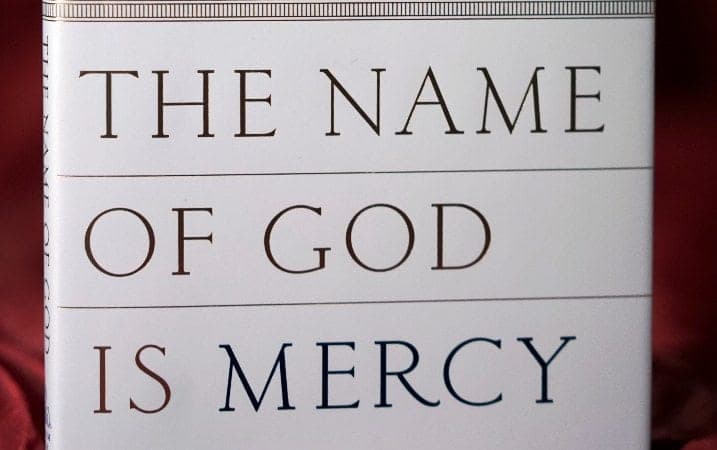“The Name of God is Mercy” is Pope Francis’ first book since his election to the papacy in March 2013. It’s the result of an interview between the pontiff and veteran Italian Vatican writer Andrea Tornielli, which took place in July 2015 shortly after Francis had returned from a journey to Ecuador, Bolivia, and Paraguay.
The aim of the book is for Francis to explain the vision behind his extraordinary jubilee Holy Year of Mercy, which he launched on Dec. 8 by opening the holy door at St. Peter’s Basilica, and which will run until Nov. 20, 2016.
Mercy is a cornerstone spiritual value for Francis, expressed in his papal motto (the same motto he used as a bishop): Miserando atque eligendo, or “Choosing through mercy.” He has said he sees the present era as a kairos of mercy, using a Greek New Testament term that means a privileged moment in God’s plan of salvation.
The following are five points from the book that get to the heart of Francis’ message.
God’s ‘ID card’: Francis insists repeatedly throughout the book that mercy is the very essence of God. Here’s a typical way he expresses the point:
Jesus said he came not for those who were good but for the sinners. He did not come for the healthy, who do not need the doctor, but for the sick. For this reason, we can say that mercy is God’s identity card. God of Mercy, merciful God. For me, this really is the Lord’s identity.
Merciful priests: The pontiff describes the example of several merciful priests he’s known across the years. Two in particular seem to have left a deep impression, including one he met as a teenager, the Rev. Carlos Duarte Ibarra, who would end up dying the next year.
I still remember how when I got home, after his funeral and burial, I felt as though I had been abandoned. I cried a lot that night, really a lot, and hid in my room. Why? Because I had lost a person who helped me feel the mercy of God.
He also describes a Capuchin priest who came to him in Buenos Aires to say he worried that he was too merciful when hearing confessions. The future pope asked the Capuchin if he had prayed about it.
This is what he says the priest told him: “I go to our chapel and stand in front of the tabernacle and say to Jesus: ‘Lord, forgive me if I have forgiven too much. But you’re the one who gave me the bad example!’”
Francis says:
I will never forget that. When a priest experiences giving mercy to himself like that, he can give it to others.
‘Apostolate of the ear’: Francis speaks about the importance of the sacrament of Confession, stressing among other things that priests need to listen carefully to what people have to say.
Mostly, people are looking for someone to listen to them. Someone willing to grant them time, to listen to their dramas and difficulties. This is what I call the ‘apostolate of the ear,’ and it is important. Very important. I feel compelled to say to confessors: talk, listen with patience, and above all tell people that God loves them.
In another place, Francis says:
In a dialogue with a confessor we need to be listened to, not interrogated.
Self-righteousness: Listening to Francis, it often seems that nothing gets under his skin quite as much as self-righteousness, the attitude of condemning flaws in others without acknowledging them in oneself.
Francis says that throughout the “long history of the Church,” there have been people who don’t seem to understand this, comparing them to scholars of the law in the New Testament who attempted to lay traps for Jesus.
Jesus, he says, is forever a threat to rigidity.
Then, as today, this kind of logic and conduct can be shocking, it provokes angry mutterings from those who are only ever used to having things fit into their preconceived notions and ritual purity instead of letting themselves be surprised by reality, by a greater love or a higher standard.
At times I have surprised myself by thinking that a few very rigid people would do well to slip a little so that they could remember that they are sinners and thus meet Jesus.
Mercy in action: Francis insists that mercy needs to be expressed in acts of compassion, especially for the poor and the marginalized.
If we look at our situation, our society, it seems to me that there is no lack of circumstance or opportunities all around us.
What should we do for the homeless man camped in front of our home, for the poor man who has nothing to eat, for the neighboring family who cannot make it to the end of the month due to the recession, because the husband lost his job?
How should we behave with the immigrants who have survived the crossing and who land on our shores?” What should we do for the elderly who are alone, abandoned, and who have no one?
Francis closes by quoting St. John of the Cross:
In the evening of life, we will be judged on love alone.
















